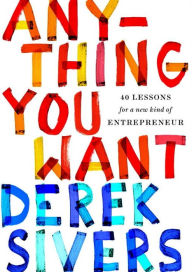21. Anything You Want - Derek Sivers (📱)
28 May 2017
Rating 9/10
Reading Notes:
You need to know your personal philosophy of what makes you happy and what’s worth doing.
No “yes.” Either “Hell yeah!” or “no.”
You can use this same rule on yourself if you’re often overcommitted or too scattered. If you’re not saying, “Hell yeah!” about something, say no. When deciding whether to do something, if you feel anything less than “Wow! That would be amazing! Absolutely! Hell yeah!” then say no. When you say no to most things, you leave room in your life to throw yourself completely into that rare thing that makes you say, “Hell yeah!
Watch out when anyone (including you) says he wants to do something big, but can’t until he raises money. It usually means the person is more in love with the idea of being big-big-big than with actually doing something useful.
You need to confidently exclude people, and proudly say what you’re not. By doing so, you will win the hearts of the people you want.
It’s a big world. You can loudly leave out 99 percent of it.
Journalists would ask, “What’s your long-term goal for CD Baby?” I’d say, “I don’t have one. I surpassed my goals long ago. I’m just trying to help musicians with whatever they need today.” So please don’t think you need a huge vision. Just stay focused on helping people today.
Never forget why you’re really doing what you’re doing. Are you helping people? Are they happy? Are you happy? Are you profitable? Isn’t that enough?
We all grade ourselves by different measures:
- For some people, it’s as simple as how much money they make. When their net worth is going up, they know they’re doing well.
- For others, it’s how much money they give.
- For some, it’s how many people’s lives they can influence for the better.
- For others, it’s how deeply they can influence just a few people’s lives. For me, it’s how many useful things I create, whether songs, companies, articles, websites, or anything else. If I create something that’s not useful to others, it doesn’t count. But I’m also not interested in doing something useful unless it needs my creative input.
How do you grade yourself? It’s important to know in advance, to make sure you’re staying focused on what’s honestly important to you, instead of doing what others think you should.
If you set up your business like you don’t need the money, people are happier to pay you. When someone’s doing something for the money, people can sense it, like they sense a desperate lover. It’s a turnoff.
When you’re thinking of how to make your business bigger, it’s tempting to try to think all the big thoughts and come up with world-changing massive-action plans. But please know that it’s often the tiny details that really thrill people enough to make them tell all their friends about you.
Just pay close attention to what excites you and what drains you. Pay close attention to when you’re being the real you and when you’re trying to impress an invisible jury.